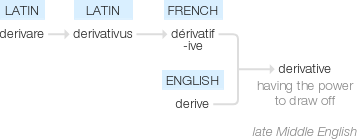Derivative
late Middle English (in the adjective sense ‘having the power to draw off’, and in the noun sense ‘a word derived from another’): from French dérivatif, -ive, from Latin derivativus, from derivare (see derive).
wiktionary
From Middle French dérivatif, from Latin dērīvātus, perfect passive participle of dērīvō(“I derive”). Related with derive.
etymonline
derivative (adj.)
early 15c., in a now-obsolete medical sense, "having the property of drawing off or away," from Old French derivatif (15c.) and directly from Late Latin derivativus, from derivat-, past-participle stem of Latin derivare "to lead or draw off" (see derive). Meaning "taken or having proceeded from another or others, secondary" is from 1520s. Related: Derivatively; derivativeness.
derivative (n.)
mid-15c., "a derived word or form, a word formed immediately or remotely from another or a root," from derivative (adj.). General sense of "that which is derived or deduced from another" is from 1590s. Mathematical sense, "a derivative function," is from 1670s. In chemistry, "compound that can be made from a parent compound by replacement of one atom with another atom or group of atoms," by 1855.
